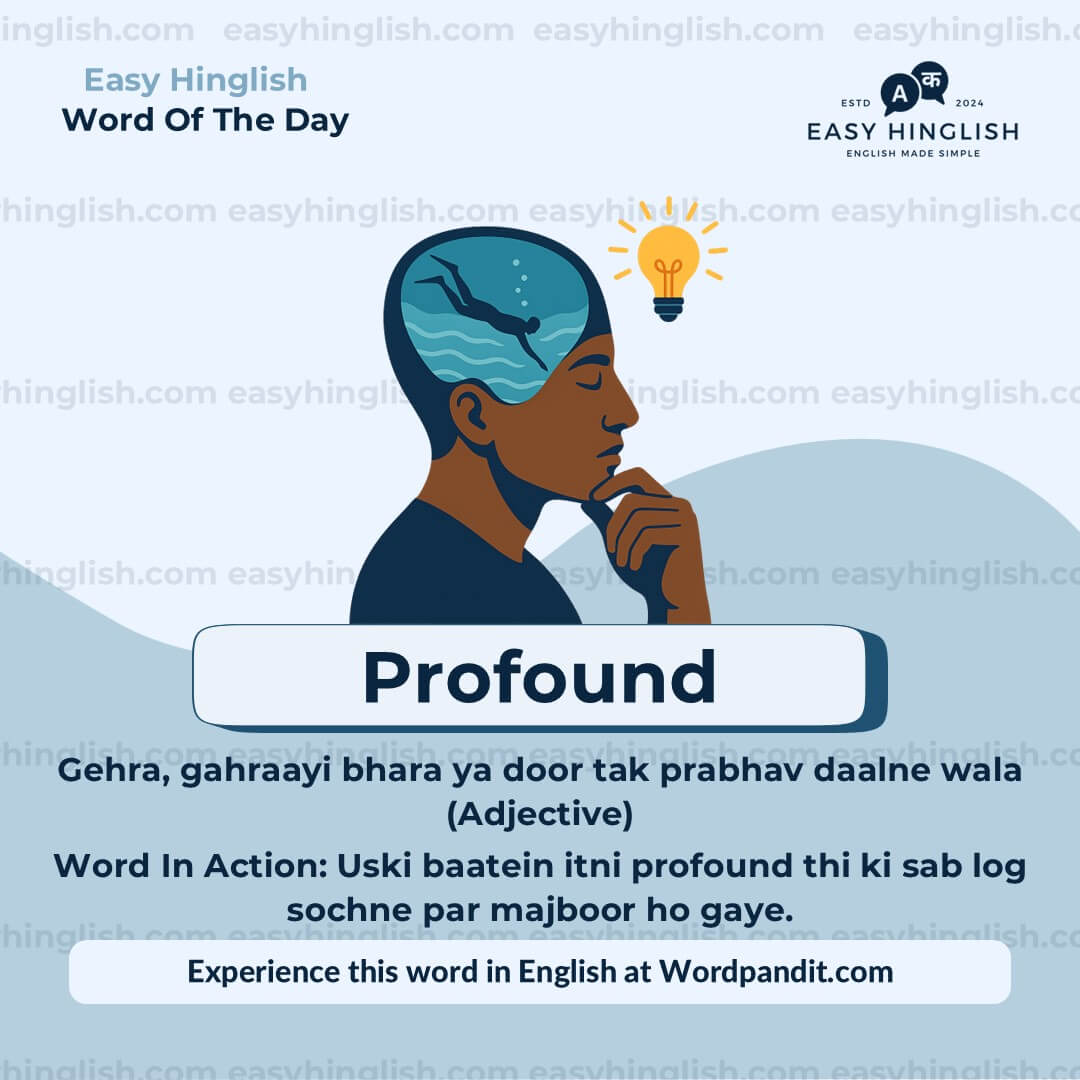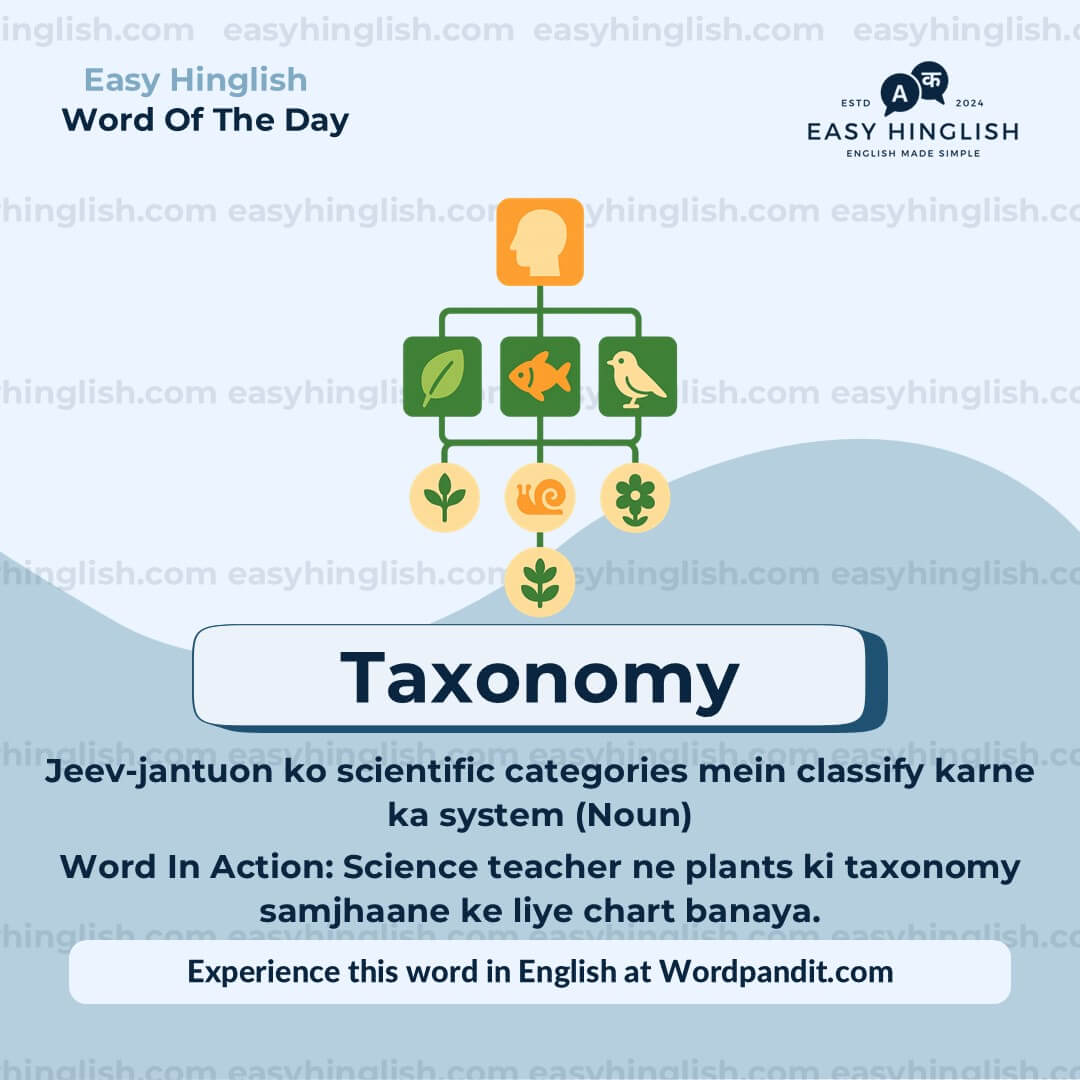Daily Vocabulary International Newspapers aur Publications se Seekho
Wordpandit ke Global Vocabulary Hub ke Saath Apni Vocabulary Expand Karo
Wordpandit par, hum aapko ek truly global vocabulary develop karne me madad karte hain, jo duniya ke sabse respected international publications se li gayi hoti hai. Yeh section aapko naye words se introduce karne ke liye design kiya gaya hai jo global conversations aur trends ko define karte hain.
Global Sources ka Power
Aapko globally sochne aur communicate karne me madad dene ke liye, hum vocabulary curate karte hain world ke top international sources se, jaise:
- The New York Times
- The Washington Post
- BBC
- The Guardian
- The Economist
- Scientific American
- Psychology Today
- Aur bhi bahut saare...
Globally Socho, Competitively Seekho
Hamare daily updates se aap international publications ke naye words seekhoge jo global news aur developments se jude hote hain. Isse aapki vocabulary current bhi rahegi aur globally relevant bhi.
Apni Global Soch Ko Expand Karo
Agar aap international exams ki tayari kar rahe ho, global business communication me excel karna chahte ho, ya sirf apni language skills improve karna chahte ho, toh Wordpandit aapko global level pe grow karne ke liye best resources provide karta hai.
Smart Learning, Global Reach
Hamari learning methodology me global examples, memory aids, aur interactive activities shamil hain, jo naye words ko effectively yaad karne aur real-world me use karne me madad karti hain.
Aaj Hi Apni Global Vocabulary Journey Shuru Karo!
Wordpandit Kyun Choose Karein?
Practical Learning: Aise words seekho jo real-world reading aur communication me aapko sach me kaam aayenge, taaki aapki comprehension aur bolne ki skills improve ho.
Diverse Content: Current affairs se lekar scientific breakthroughs tak, hamare different sources aapko multiple domains ki vocabulary seekhne ka moka dete hain.
Effortless Integration: Wordpandit ko apni daily routine ka part banao. Sirf kuch minute har din dene se aapki vocabulary time ke saath kaafi improve ho sakti hai.
Vocabulary Mastery Tak Ka Aapka Safar
- Regularly hamare Daily Vocabulary section ko visit karo
- Naye words explore karo aur unka context me use samjho
- In words ko apni writing aur bolne ki practice me use karne ki koshish karo
- Jaise-jaise aapke words badhte hain, apni progress ko track karo
Aaj Hi Apni Vocabulary Journey Shuru Karo!
Wordpandit ke saath vocabulary improve karna start karo. Roz thoda effort dalne se aap ek strong vocabulary develop kar sakte ho jo academic, professional, aur personal life me kaafi kaam aayegi.
Yaad rakho, ek naya shabd roz seekhna linguistic limitations ko door karne ka best tareeka hai! Wordpandit ko apni daily learning journey ka sathi banao aur vocabulary excellence ki taraf badho!
WORD-1: Profound
Sandarbh (Context):
"To lump or to split? Deciding whether an animal is a species or subspecies profoundly influences our conservation priorities." - Aeon
Vyakhya (Explanatory Paragraph):
"Profound" aise cheezon ke liye use hota hai jo bahut gehri, intense ya meaningful hoti hain. Jab kisi decision ka "profound influence" hota hai, iska matlab hai uska effect bahut gehra aur door tak padne wala hota hai. Sirf surface-level nahi, balki core tak impact karta hai.
Arth (Meaning): Gehra, gahraayi bhara ya door tak prabhav daalne wala (Adjective)
Uccharan (Pronunciation): proh-fownd
Kathinai Star (Difficulty Level): ⭐⭐⭐ Intermediate
Utpatti (Etymology): Latin shabd *profundus* se, jiska matlab hota hai "deep" (*pro-* = forward + *fundus* = bottom)
Prashant Sir Ke Tathya (Prashant Sir's Notes):
"Profound" ka use un cheezon ke liye karo jo bahut zyada meaningful, emotional ya impactful ho – jaise koi thought, feeling ya decision. Sirf important nahi, balki dil tak chhoo jaane wala.
Samanarthi & Vipritarthi (Synonyms & Antonyms):
Samanarthi (Synonyms): deep, intense, significant, weighty, insightful
Vipritarthi (Antonyms): superficial, shallow, trivial, insignificant
Udaharan (Usage Examples):
- Professor ka lecture itna profound tha ki meri soch hi badal gayi.
- Lake ke paas meditation karte waqt usne profound shanti mehsoos ki.
Sanskritik Sandarbh (Cultural Reference):
"The most profound statements are often said in silence." – Lynn Johnston
Sochiye (Think About It):
Kya ek decision itna profound ho sakta hai ki woh history ka rukh badal de? Aapke liye profound ka matlab kya hai?
Chhoti Kriya (Quick Activity):
Apne life ke 3 aise moments likho jo aapko profound lage ho. Sochiye – unhe special kis cheez ne banaya?
Yaad Karne Ka Tarika (Memory Tip):
Socho "profound" matlab ek idea jo “pro” (aage) jaata hai aur “found” (niche tak) – yaani gehraayi mein jata hai!
Vastavik Jeevan Me Upyog (Real-World Application):
Psychology, philosophy, aur policymaking jaisi fields mein "profound" un thoughts ya decisions ke liye use hota hai jo deeply meaningful ya impactful hote hain. Daily life mein bhi aap emotions ya insights describe karte waqt use kar sakte ho.
WORD-2: Continuum
Sandarbh (Context):
"The same attitudes that propel a horrific continuum of colonial violence in the Global South propel it on a smaller scale in the Global North." - The Wire
Vyakhya (Explanatory Paragraph):
"Continuum" ka matlab hai koi aisi cheez jo continuously chalti hai bina kisi clear boundary ya break ke. Is sentence mein, "colonial violence" ko ek continuum bataya gaya hai—yaani yeh alag-alag incidents nahi hain, balki ek hi sequence ka hissa hain jo time aur jagah ke across chalta ja raha hai.
Arth (Meaning): Ek lagataar series ya range jisme aas-paas ke elements alag nahi lagte, lekin extremes alag hote hain (Noun)
Uccharan (Pronunciation): kun-TIN-yoo-um
Kathinai Star (Difficulty Level): ⭐⭐⭐⭐ Advanced
Utpatti (Etymology): Latin shabd *continuum* se, jiska matlab hai "ek lagataar cheez", *continuus* (matlab uninterrupted) se aaya
Prashant Sir Ke Tathya (Prashant Sir's Notes):
"Continuum" ka use zyada tar academic ya scientific context mein hota hai, jaise behavior, development ya ideas ke gradual evolution ko dikhane ke liye. Ek aisa flow jisme koi sudden break nahi hota.
Samanarthi & Vipritarthi (Synonyms & Antonyms):
Samanarthi (Synonyms): sequence, range, span, spectrum, progression
Vipritarthi (Antonyms): interruption, break, gap, disconnection
Udaharan (Usage Examples):
- Learning ek aisa process hai jo growth aur development ke continuum par chalta rehta hai.
- Emotions ka continuum joy se lekar sadness tak hota hai, beech mein kai feelings hoti hain.
Sanskritik Sandarbh (Cultural Reference):
"Life and death are not opposites but rather points on the same continuum." – kai philosophical views se prerit
Sochiye (Think About It):
Kya insani behavior ke positive aur negative actions ek hi moral continuum ke part hain? Line kahaan kheechte ho aap?
Chhoti Kriya (Quick Activity):
Do opposites choose karo (jaise calm aur angry) aur beech mein 3 emotions likho jo is continuum mein aa sakte hain.
Yaad Karne Ka Tarika (Memory Tip):
Socho “continuum” matlab “continue + umm”—yaani koi cheez jo rukti nahi, bas chalte jaati hai!
Vastavik Jeevan Me Upyog (Real-World Application):
"Continuum" ka use sociology, medicine, physics, aur psychology mein hota hai—jahan cheezon ka gradual transition hota hai, jaise autism spectrum, political views ya grief ke stages. Binary thinking ke bajay complexity ko dikhata hai.
WORD-3: Amateurs
Sandarbh (Context):
"The financial arrangements soon proved inadequate. Set sales were disappointing as amateurs made their own receivers and listeners bought rival unlicensed sets." - Aeon
Vyakhya (Explanatory Paragraph):
"Amateurs" un logon ko refer karta hai jo kisi activity mein sirf interest ya passion ke liye hissa lete hain, na ki profession ke roop mein. Is example mein, ye log apne radio receivers khud bana rahe the – matlab unhone khud se seekh kar kaam kiya, bina kisi commercial ya licensed system ke. Ye lazmi nahi ki unka kaam bekaar ho, bas ye ki wo professional nahi the.
Arth (Meaning): Wo log jo kisi activity mein bina professional training ke, sirf shauk ya interest se hissa lete hain (Noun, plural)
Uccharan (Pronunciation): AM-uh-churz
Kathinai Star (Difficulty Level): ⭐⭐ Basic
Utpatti (Etymology): French *amateur* se, jiska matlab hai “lover of,” aur Latin *amator* se, jo aata hai *amare* (to love) – matlab shauk se koi kaam karna, paisa kamaane ke liye nahi.
Prashant Sir Ke Tathya (Prashant Sir's Notes):
“Amateur” ka matlab sirf inexperienced nahi hota. Ye passion aur dedication bhi dikhata hai. Kabhi-kabhi amateurs woh kar jaate hain jo professionals nahi kar paate – kyunki unmein asli lagan hoti hai.
Samanarthi & Vipritarthi (Synonyms & Antonyms):
Samanarthi (Synonyms): hobbyist, novice, non-professional, dabbler, layperson
Vipritarthi (Antonyms): professional, expert, specialist, veteran
Udaharan (Usage Examples):
- Amateurs hone ke bawajood, unhone ek aisa short film banaya jo viral ho gaya.
- Kai scientific discoveries aise curious amateurs ne ki hain jinke paas sirf passion tha.
Sanskritik Sandarbh (Cultural Reference):
"Every professional was once an amateur." – ek popular motivational quote, especially creative aur sports world mein.
Sochiye (Think About It):
Kya kabhi-kabhi amateurs professionals se better perform kar sakte hain? Kya sirf training kaafi hoti hai ya passion bhi zaroori hai?
Chhoti Kriya (Quick Activity):
Tin aise fields ya hobbies likho jahan amateurs ne remarkable contributions diye hain. Unse kya seekh milti hai?
Yaad Karne Ka Tarika (Memory Tip):
Amateur = “ama” (love) + “teur” (karnewala) → jo kaam pyaar se kare, na ki paisa kamaane ke liye.
Vastavik Jeevan Me Upyog (Real-World Application):
“Amateur” ka use sports, arts, science, aur tech jaisi fields mein hota hai. Aaj kal online tools aur open-source platforms ke through, amateurs bhi real impact create kar rahe hain – chahe coding ho, filmmaking ho ya astronomy.
WORD-4: Correspond
Sandarbh (Context):
"Kind,’ they argue, is a Biblical classification that corresponds to the modern ‘family’, and not, as you might imagine, to the modern concept of ‘species’. If Noah had accessed a modern taxonomic catalogue, he might have found himself with a cargo of up to 30,000 varieties of mammal, bird and reptile." - Aeon
Vyakhya (Explanatory Paragraph):
"Correspond" ka matlab hota hai jab do cheezen ek dusre se match karti hain, ya kisi tarah se similar hoti hain. Yahan pe "kind" jo ek Biblical term hai, usko modern science ke "family" category se match kiya gaya hai, na ki "species" se. Matlab dono alag systems ke terms hone ke bawajood unka meaning ya level of grouping milta-julta hai.
Arth (Meaning): Kisi cheez se milna-julna, match ya align karna (Verb)
Uccharan (Pronunciation): kor-uh-SPOND
Kathinai Star (Difficulty Level): ⭐⭐⭐ Intermediate
Utpatti (Etymology): Latin *correspondere* se, jiska matlab hai “sath jawab dena” (*com-* = together + *respondere* = to answer)
Prashant Sir Ke Tathya (Prashant Sir's Notes):
"Correspond" ka use do tareeke se hota hai—jab do cheezen ek doosre se match ya relate karti hain, aur doosra communication ke context mein, jaise "correspond karna letters ke through." Context dhyaan se samjho!
Samanarthi & Vipritarthi (Synonyms & Antonyms):
Samanarthi (Synonyms): match, align, relate, equate, coincide
Vipritarthi (Antonyms): differ, mismatch, contradict, conflict
Udaharan (Usage Examples):
- Map ke coordinates real-world locations se correspond karte hain.
- Uski actions uske promises se bilkul correspond nahi karti thi.
Sanskritik Sandarbh (Cultural Reference):
"Correspondence chess" ek aisa chess game hota hai jahan players mail ya email ke zariye apni moves bhejte hain – isse "correspond" ka communication waala matlab samajh aata hai.
Sochiye (Think About It):
Kya aapke intentions hamesha aapke actions se correspond karte hain? Agar nahi, to unhe align karne ke liye kya zaroori hai?
Chhoti Kriya (Quick Activity):
Kuch purane historical terms lo (jaise “alchemy”) aur unke modern counterparts se match karo (jaise “chemistry”). Teen pairs banane ki koshish karo.
Yaad Karne Ka Tarika (Memory Tip):
Socho “correspond” matlab “co-respond” – yaani do cheezen jo ek saath react ya match karti hain.
Vastavik Jeevan Me Upyog (Real-World Application):
"Correspond" ka use har tarah ke academic aur daily settings mein hota hai – data, ideas ya logon ke beech connections dikhane ke liye. Ye comparisons aur understanding develop karne mein madad karta hai – chahe woh research ho ya emails exchange karna ho.
WORD-5: Taxonomy
Sandarbh (Context):
"If Noah had accessed a modern taxonomic catalogue, he might have found himself with a cargo of up to 30,000 varieties of mammal, bird and reptile." - Aeon
Vyakhya (Explanatory Paragraph):
"Taxonomy" ka matlab hai living organisms ko scientific tareeke se classify karna ya group banana. Ye system humein life ke diversity ko samajhne mein help karta hai – jaise kingdom, phylum, class, order, family, genus, aur species. Is sentence mein bataya gaya hai ki agar Noah ke paas aaj ka modern taxonomic catalogue hota, to use 30,000 alag-alag animal types ke saath deal karna padta!
Arth (Meaning): Jeev-jantuon ko scientific categories mein classify karne ka system (Noun)
Uccharan (Pronunciation): tak-SAW-nuh-mee
Kathinai Star (Difficulty Level): ⭐⭐⭐⭐ Advanced
Utpatti (Etymology): Greek shabdon *taxis* (arrangement) + *nomia* (method ya system) se bana hai
Prashant Sir Ke Tathya (Prashant Sir's Notes):
Taxonomy sirf biology tak simit nahi hai. Ye kisi bhi organized system of classification ke liye use ho sakta hai – chahe wo digital files ho, academic subjects ho, ya human personalities. Lekin scientific context mein, living organisms ke classification mein sabse zyada use hota hai.
Samanarthi & Vipritarthi (Synonyms & Antonyms):
Samanarthi (Synonyms): classification, categorization, systematics, nomenclature
Vipritarthi (Antonyms): disorganization, chaos, randomness (contextual)
Udaharan (Usage Examples):
- Modern taxonomy scientists ko alag-alag species ke relations samajhne mein madad karti hai.
- Genetic research ke baad plant taxonomy mein kaafi badlav aaya hai.
Sanskritik Sandarbh (Cultural Reference):
Swedish botanist Carl Linnaeus ko "father of modern taxonomy" kaha jata hai. Unhone binomial nomenclature (e.g., *Homo sapiens*) develop kiya tha jo aaj bhi use hota hai.
Sochiye (Think About It):
Kya humans ka sab kuch classify karne ka craze unki world ko control aur samajhne ki ichha dikhata hai? Aap kya sochte hain?
Chhoti Kriya (Quick Activity):
Ek simple animal (jaise billi ya kauwa) lo aur uska full taxonomic classification (kingdom se species tak) likhne ki koshish karo.
Yaad Karne Ka Tarika (Memory Tip):
"Taxonomy" = “tax” (arrange) + “nomy” (name system) → yaani cheezon ko systematically naam dena aur arrange karna.
Vastavik Jeevan Me Upyog (Real-World Application):
Taxonomy ka use biology, medicine, agriculture aur conservation mein hota hai. Ye diseases ko track karne, evolution ko samajhne aur endangered species ko bachane mein help karta hai. Websites ya apps mein bhi taxonomy content ko organize karne ke liye use hota hai.













